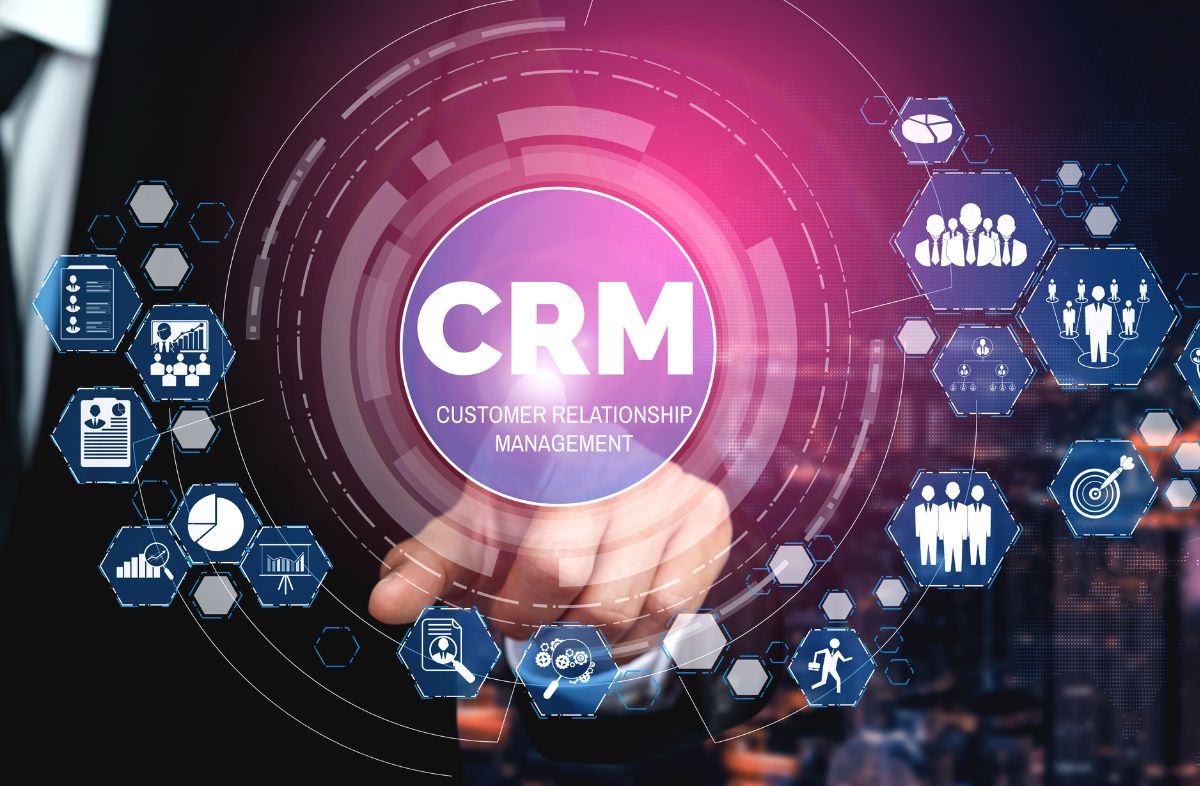Welcome to our comprehensive guide on the best eCommerce CRM systems. In today’s competitive online marketplace, effectively managing customer relationships is crucial for the success of any eCommerce business. By implementing a robust CRM system tailored to your specific needs, you can enhance customer engagement, streamline sales and marketing efforts, and gain valuable insights to drive business growth. In this article, we will explore the top eCommerce CRM systems, discuss their key features and benefits, and provide valuable insights on choosing, implementing, and optimizing CRM systems for your online business.
What Is a Customer Relationship Management System?
A customer relationship management system, commonly referred to as CRM, is a software application that enables businesses to manage and analyze customer interactions and data throughout the customer lifecycle. CRM systems provide a centralized database that stores and organizes customer information, allowing businesses to streamline processes, enhance communication, and improve customer satisfaction.
Why is CRM Important for eCommerce Businesses?
CRM is vital for eCommerce businesses as it allows them to gain a deep understanding of their customers, their preferences, and their purchasing behaviors. By leveraging CRM systems, businesses can personalize customer experiences, target marketing campaigns more effectively, and optimize sales processes. Additionally, CRM systems help streamline customer support, enhance communication, and improve overall operational efficiency.
Key Features to Look for in eCommerce CRM Systems
Customer Data Management
A robust eCommerce CRM system should provide comprehensive customer data management capabilities. This includes storing customer profiles, contact information, purchase history, and communication logs. The system should enable easy search and retrieval of customer data for personalized marketing and support.
Sales and Lead Management
Effective CRM systems offer features for managing sales pipelines, tracking leads, and automating sales processes. Look for functionalities such as lead scoring, opportunity management, and automated follow-up reminders to maximize your sales team’s productivity.
Marketing Automation
Automation is a key component of successful CRM systems. Look for features like email marketing automation, campaign management, and customer segmentation to streamline your marketing efforts and nurture leads effectively.
Integration Capabilities
Ensure that your chosen CRM system integrates seamlessly with your eCommerce platform, email marketing tools, customer support software, and other essential business applications. Integration enables efficient data flow, eliminates duplicate data entry, and provides a unified view of customer interactions.
Reporting and Analytics
A robust CRM system should offer comprehensive reporting and analytics capabilities. Look for features like customizable dashboards, sales forecasting, customer segmentation analysis, and ROI tracking to gain valuable insights into your business performance.
Integration with Other Business Systems
For seamless operations, CRM systems integrate with various other business systems such as ERP, accounting, and e-commerce platforms. These integrations ensure data consistency, eliminate manual data entry, and enable a holistic view of business processes.
Mobile Access and Remote Capabilities
In today’s mobile-centric world, CRM systems offer mobile applications that enable remote access to customer information, sales data, and collaboration tools. This empowers sales and support teams to work efficiently from anywhere, enhancing productivity and responsiveness.
Benefits of Implementing a CRM System in eCommerce
Enhanced Customer Relationship Management
Implementing a CRM system in your eCommerce business enables you to gain a holistic view of your customers, including their purchase history, preferences, and interactions with your brand. This comprehensive understanding allows you to provide personalized experiences, offer targeted promotions, and build long-term relationships with your customers.
Streamlined Sales and Marketing Processes
CRM systems automate various sales and marketing processes, such as lead management, email marketing, and campaign tracking. By streamlining these processes, you can optimize resource allocation, improve conversion rates, and drive revenue growth.
Improved Customer Support and Communication
With a CRM system, you can centralize customer support inquiries, track their status, and ensure timely resolution. Additionally, CRM systems provide tools for effective communication, such as email integration and chat functionality, enabling seamless interaction with customers.
Data-Driven Decision Making
CRM systems capture and analyze vast amounts of customer data, allowing you to derive valuable insights. By leveraging these insights, you can make data-driven decisions, refine your marketing strategies, identify cross-selling and upselling opportunities, and optimize customer satisfaction.
Scalability and Growth
CRM systems are designed to scale with growing businesses. As customer databases expand and operations become more complex, CRM systems can adapt and accommodate changing needs, ensuring seamless growth and scalability.
How to Choose the Right eCommerce CRM System
Identify Your Business Requirements
Before selecting an eCommerce CRM system, assess your business needs, current pain points, and long-term goals. Consider factors such as your target market, product/service offerings, scalability requirements, and budget limitations.
Evaluate Key Features and Functionality
Create a checklist of features that are crucial for your business operations. Consider aspects like customer data management, sales and lead management, marketing automation, integration capabilities, and reporting and analytics. Compare different CRM systems based on these criteria.
Consider Scalability and Flexibility
Ensure that the CRM system can scale alongside your business growth. Evaluate its flexibility to accommodate evolving business needs, such as adding new features, customizations, and integration with third-party applications.
Integration with Existing Systems
Check whether the CRM system integrates smoothly with your existing eCommerce platform, marketing tools, customer support software, and other essential systems. Integration eliminates data silos and enhances data flow and operational efficiency.
User Experience and Ease of Use
A user-friendly CRM system is essential for seamless adoption and optimal utilization. Look for intuitive interfaces, customizable dashboards, and easy navigation. Consider the availability of training and support resources to ensure a smooth transition.
Best 20 eCommerce CRM Systems
1. Zendesk
Zendesk is a popular eCommerce Customer Relationship Management (CRM) system that offers a comprehensive set of tools to enhance customer support and engagement. With features like ticket management, live chat, and self-service options, Zendesk allows businesses to efficiently address customer inquiries and provide personalized assistance. The platform also provides robust analytics and reporting capabilities, enabling businesses to gain valuable insights into customer interactions and satisfaction levels. With its user-friendly interface and customizable workflows, Zendesk helps eCommerce businesses streamline their customer support processes and build strong customer relationships.
2. HubSpot
HubSpot is an all-in-one CRM system that caters to the unique needs of eCommerce businesses. It offers a range of features to manage marketing, sales, and customer service processes. With its marketing automation tools, eCommerce businesses can create targeted campaigns, track customer behavior, and personalize communications. HubSpot’s CRM system provides a unified view of customer data, allowing businesses to understand customer preferences and deliver personalized shopping experiences. The platform also offers robust integrations with popular eCommerce platforms, enabling seamless data synchronization. With its comprehensive features and focus on automation, HubSpot helps eCommerce businesses optimize their marketing efforts and drive customer engagement.
3. Salesforce
Salesforce is a leading CRM system that offers a wide range of capabilities for eCommerce businesses. Its robust features include contact and lead management, opportunity tracking, sales forecasting, and marketing automation. Salesforce’s eCommerce Cloud provides specialized features such as product catalog management, personalized shopping experiences, and order management. The platform also integrates with popular eCommerce platforms, allowing businesses to centralize their customer data and streamline operations. Salesforce’s analytics and reporting features provide valuable insights into customer behavior, enabling businesses to make data-driven decisions. With its scalability and industry expertise, Salesforce is a trusted choice for eCommerce businesses seeking a powerful CRM solution.
4. Zoho CRM
Zoho CRM offers eCommerce businesses a comprehensive suite of tools to manage their customer relationships and sales processes. The platform provides features such as contact management, lead scoring, sales automation, and order management. Zoho CRM’s eCommerce-specific capabilities allow businesses to track and manage customer interactions, monitor sales pipelines, and streamline order fulfillment. The platform integrates with popular eCommerce platforms and payment gateways, facilitating seamless data flow and transaction management. Zoho CRM’s customization options and analytics features enable businesses to adapt the CRM system to their unique eCommerce requirements and gain insights into customer behavior.
5. Freshworks CRM
Freshworks CRM, formerly known as Freshsales, offers a range of eCommerce-focused features to help businesses optimize their sales and customer relationship management processes. The platform provides contact and lead management, sales automation, email integration, and analytics. Freshworks CRM’s eCommerce capabilities enable businesses to track leads, manage sales opportunities, and automate follow-up communications. The platform also offers robust analytics and reporting features, allowing eCommerce businesses to gain insights into sales performance and customer behavior. With its intuitive interface and tailored eCommerce features, Freshworks CRM empowers businesses to streamline their sales processes and deliver exceptional customer experiences.
6. Pipedrive
Pipedrive is a sales-focused CRM system that caters to the needs of eCommerce businesses. It provides features such as contact and lead management, deal tracking, and sales pipeline visualization. Pipedrive’s visual interface allows businesses to effectively manage their sales opportunities and prioritize their activities. The platform also integrates with popular eCommerce platforms, enabling seamless data synchronization and order management. Pipedrive’s automation features help eCommerce businesses automate repetitive tasks and streamline their sales processes. With its emphasis on sales pipeline management and user-friendly design, Pipedrive is a valuable CRM solution for eCommerce businesses aiming to optimize their sales performance.
7. Fireberry
Fireberry is an innovative customizable platform designed specifically to help salespeople increase their bottom line. The platform also serves as a source of inspiration for marketing teams, enabling them to create effective strategies and campaigns. Additionally, this platform offers valuable features for customer service teams to ensure delightful experiences. Developed from scratch by a team of experienced developers, Fireberry was born out of the desire to enhance customer relations. With a focus on providing a powerful, flexible, affordable, and quick-to-implement solution, Fireberry is a great choice for eCommerce business.
8. Nimble
Nimble is a social CRM system that helps eCommerce businesses build and nurture relationships with their customers by integrating social media and contact management features. The platform provides features such as contact management, social media listening and engagement, email integration, and sales analytics. Nimble allows businesses to gather social insights about their contacts and engage with them effectively on popular social media platforms. The CRM system provides a unified view of customer interactions across multiple channels, enabling businesses to better understand and engage with their customers. Nimble’s interface is designed to simplify the process of managing contacts and social interactions, making it easy for eCommerce businesses to leverage social media for building stronger customer relationships.
9. Agile CRM
Agile CRM offers eCommerce businesses a comprehensive CRM system with a focus on automation and customer engagement. The platform provides features such as contact management, email marketing, telephony integration, helpdesk functionality, and sales analytics. Agile CRM’s automation capabilities allow businesses to create personalized customer journeys, automate repetitive tasks, and optimize marketing campaigns. The platform’s email marketing features enable businesses to deliver targeted communications and track campaign effectiveness. Agile CRM’s user-friendly interface and affordability make it an attractive choice for eCommerce businesses looking to streamline their customer engagement processes and drive sales.
10. Bitrix24
Bitrix24 offers eCommerce businesses a comprehensive CRM system that combines customer management, collaboration, and communication tools in one unified platform. The platform provides features such as contact and lead management, sales automation, project management, team collaboration, and communication features. Bitrix24’s CRM system allows businesses to store and manage customer data, track sales opportunities, and automate sales processes. The platform also offers a range of collaboration tools, such as document management, task tracking, and team communication, promoting efficient teamwork within the organization. Bitrix24 integrates with popular eCommerce platforms, providing businesses with a seamless workflow across different business functions. With its extensive feature set and integrated collaboration capabilities, Bitrix24 is a versatile CRM solution suitable for eCommerce businesses of all sizes.
11. Nutshell CRM
Nutshell CRM offers eCommerce businesses a user-friendly CRM system that helps streamline their sales processes and manage customer relationships effectively. The platform provides features such as contact management, deal tracking, email integration, and sales analytics. Nutshell CRM’s visual interface and customizable workflows make it easy for eCommerce businesses to track and manage sales opportunities through pipelines. The system offers a clear overview of the sales pipeline, allowing sales teams to identify bottlenecks and prioritize activities. Nutshell CRM integrates with popular eCommerce platforms, facilitating seamless data synchronization and enhancing sales efficiency. With its simplicity and effectiveness, Nutshell CRM is a suitable choice for eCommerce businesses looking to optimize their sales performance.
12. Capsule CRM
Capsule CRM provides eCommerce businesses with a flexible and user-friendly CRM system to manage customer relationships and sales processes. The platform offers features such as contact management, deal tracking, email integration, and sales analytics. Capsule CRM allows businesses to store and organize customer information, track sales opportunities, and automate sales processes. The system integrates with popular eCommerce platforms, enabling businesses to centralize their customer data and streamline operations. Capsule CRM’s customization options and intuitive interface make it easy for eCommerce businesses to tailor the system to their unique requirements. With its emphasis on simplicity and effectiveness, Capsule CRM is a valuable CRM solution for eCommerce businesses.
13. Less Annoying CRM
Less Annoying CRM lives up to its name by providing eCommerce businesses with a simple and hassle-free CRM system. The platform offers features such as contact management, calendar integration, task tracking, and sales pipeline management. Less Annoying CRM’s user-friendly interface and minimalist design make it easy for eCommerce businesses to quickly adopt and navigate the system. The platform emphasizes simplicity and avoids overwhelming users with excessive features or complex workflows. Less Annoying CRM also offers excellent customer support and personalized onboarding to ensure businesses get the most out of the system. With its simplicity and customer-centric approach, Less Annoying CRM is a suitable choice for eCommerce businesses.
14. Keap (formerly Infusionsoft)
Keap, formerly known as Infusionsoft, offers a comprehensive CRM system with a strong focus on marketing automation for eCommerce businesses. The platform provides features such as contact and lead management, email marketing, campaign automation, and e-commerce integration. Keap’s CRM system allows businesses to store and manage customer data, track sales opportunities, and automate marketing campaigns. The platform’s automation capabilities enable businesses to create personalized customer journeys, track customer behavior, and deliver targeted communications. Keap also provides e-commerce integration, allowing businesses to manage online sales and customer interactions seamlessly. With its comprehensive features and emphasis on automation, Keap is a powerful CRM solution for eCommerce businesses seeking to streamline their marketing and sales processes.
15. ActiveCampaign
ActiveCampaign offers eCommerce businesses a versatile CRM and marketing automation platform to drive customer engagement and optimize marketing efforts. The platform provides features such as contact management, email marketing, marketing automation, and CRM functionality. ActiveCampaign’s CRM system enables businesses to store and manage customer data, track interactions, and automate sales and marketing processes. The platform’s marketing automation capabilities allow businesses to create personalized campaigns, track customer behavior, and deliver targeted communications. ActiveCampaign integrates with various third-party applications, providing businesses with a seamless workflow across different tools. With its focus on marketing automation and CRM integration, ActiveCampaign is an ideal choice for eCommerce businesses seeking a unified solution to manage their marketing and customer relationships.
16. Copper (formerly ProsperWorks)
Copper, previously known as ProsperWorks, offers eCommerce businesses a CRM system designed specifically for Google Workspace users. The platform provides features such as contact management, opportunity tracking, email integration, and sales analytics. Copper’s deep integration with Google Workspace allows users to manage their customer relationships directly within their familiar Google environment. The system automatically captures and organizes customer interactions from Gmail and tracks them in the CRM. Copper also offers automation features, such as email templates and workflow automation, to streamline sales processes and save time. With its native integration with Google Workspace and user-friendly interface, Copper is a valuable CRM solution for eCommerce businesses heavily reliant on Google applications.
17. SugarCRM
SugarCRM is a flexible and customizable CRM system that offers eCommerce businesses a wide range of features to manage customer relationships and sales processes. The platform provides features such as contact management, opportunity tracking, workflow automation, and customer service functionalities. SugarCRM’s open-source architecture allows businesses to tailor the CRM system to their specific requirements and integrate it with other applications. The platform also offers advanced reporting and analytics capabilities to gain insights into sales performance and customer behavior. SugarCRM can be deployed both on-premises and in the cloud, providing businesses with flexibility and control over their CRM implementation. With its extensive customization options and robust feature set, SugarCRM is a popular choice for eCommerce businesses seeking a customizable CRM solution.
18. Microsoft Dynamics 365
Microsoft Dynamics 365 offers eCommerce businesses a comprehensive CRM system that combines sales, marketing, customer service, and other business functionalities in one integrated platform. The platform provides a unified view of customer data, enabling businesses to manage customer relationships effectively. Microsoft Dynamics 365 offers features such as contact management, opportunity tracking, marketing automation, customer service management, and analytics. The platform seamlessly integrates with other Microsoft products, such as Office 365 and Power Platform, providing businesses with a familiar and connected user experience. Microsoft Dynamics 365 can be deployed on-premises or in the cloud, offering flexibility to businesses of all sizes. With its extensive suite of business applications and deep integration with Microsoft’s ecosystem, Microsoft Dynamics 365 is a top choice for eCommerce businesses seeking a comprehensive CRM solution.
19. SuiteCRM
SuiteCRM offers eCommerce businesses a comprehensive and open-source CRM system with a range of features to manage customer relationships and sales processes. The platform provides features such as contact management, lead tracking, opportunity management, workflow automation, and reporting. SuiteCRM’s open-source architecture allows businesses to customize and extend the CRM system according to their unique requirements. The platform also integrates with popular eCommerce platforms, enabling seamless data synchronization and order management. With its flexibility, customization options, and robust feature set, SuiteCRM is an ideal CRM solution for eCommerce businesses seeking a tailored and cost-effective CRM system.
20. Vtiger CRM
Vtiger CRM offers eCommerce businesses a comprehensive CRM system with a range of features to manage customer relationships, sales processes, and customer support. The platform provides features such as contact and lead management, opportunity tracking, email marketing, helpdesk functionality, and reporting capabilities. Vtiger CRM’s intuitive interface and user-friendly design make it easy for eCommerce businesses to adopt and navigate the system. The platform also offers automation features, such as workflow automation and email templates, to streamline sales and marketing processes. Vtiger CRM integrates with popular eCommerce platforms and provides seamless data synchronization, enhancing efficiency and productivity. With its extensive feature set and affordability, Vtiger CRM is a valuable CRM solution for eCommerce businesses looking to optimize their customer relationships and sales performance.
Implementation and Integration of CRM Systems
Define Clear Objectives and Scope
Before implementing a CRM system, establish clear objectives and define the scope of the project. Identify the key processes and areas where the CRM system will have the most significant impact.
Plan for Data Migration
If you are transitioning from an existing system or consolidating multiple databases, plan for data migration. Ensure data accuracy, clean up any duplicates or outdated records, and establish a data migration strategy.
Customize and Configure the CRM System
Tailor the CRM system to your business’s specific needs by customizing and configuring key modules, fields, and workflows. This will ensure that the CRM system aligns with your business processes and enhances user adoption.
Provide Adequate Training and Support
User adoption is critical for CRM implementation success. Provide comprehensive training and ongoing support to users to ensure they understand how to utilize the CRM system effectively.
Test and Validate the System
Before fully deploying the CRM system, conduct thorough testing and validation to identify any issues or bugs. This will allow you to resolve any potential problems and ensure a smooth transition.
Monitor and Refine the Implementation
Continuously monitor the CRM system’s performance and gather feedback from users. Use this feedback to refine and optimize the system, ensuring it continues to meet your business objectives.
Training and Adoption Strategies
Develop a Training Plan
Create a comprehensive training plan that covers all aspects of the CRM system, including its features, functionalities, and best practices. Consider different learning styles and provide various training formats, such as online modules, instructor-led sessions, and documentation.
Foster User Engagement and Ownership
Encourage user engagement and ownership by involving employees in the CRM system implementation process. Solicit their feedback, address their concerns, and provide opportunities for them to contribute to system enhancements.
Offer Ongoing Support and Resources
Establish a support system to assist users with any CRM-related queries or challenges. Provide a centralized knowledge base, helpdesk support, and regular communication channels to keep users informed and engaged.
Recognize and Reward Adoption
Recognize and reward employees who demonstrate exceptional CRM system adoption and utilization. This can include incentives, acknowledgment in team meetings, or career development opportunities tied to CRM proficiency.
CRM Data Management and Security
Data Quality and Integrity
Maintaining accurate and up-to-date data is essential for CRM success. Implement data quality controls, such as validation rules, data cleansing processes, and regular audits, to ensure data integrity.
Data Privacy and Security
Protecting customer data is of utmost importance. Implement robust security measures, such as encryption, access controls, and user permissions, to safeguard sensitive information from unauthorized access or breaches.
Compliance with Data Regulations
Ensure your CRM system complies with relevant data protection regulations, such as GDPR or CCPA. Understand the requirements and obligations imposed by these regulations and implement necessary measures to adhere to them.
Backup and Disaster Recovery
Establish regular backup processes and disaster recovery plans to safeguard CRM data. This ensures that critical customer information remains protected and can be restored in the event of data loss or system failures.
Evaluating the Success of Your eCommerce CRM System
Key Performance Indicators (KPIs) for CRM Success
Define relevant KPIs to measure the success of your CRM system implementation. Common CRM KPIs include customer acquisition rate, customer retention rate, conversion rate, customer satisfaction score, and average response time.
Tracking and Analyzing KPIs
Leverage reporting and analytics features in your CRM system to track and analyze KPIs. Generate regular reports and dashboards to monitor performance trends, identify areas for improvement, and make data-driven decisions.
Customer Feedback and Surveys
Collect customer feedback through surveys, reviews, and satisfaction ratings. Analyze customer sentiment and feedback to assess the effectiveness of your CRM system in meeting customer expectations and driving satisfaction.
Continuous Optimization and Adaptation
CRM systems should be continuously optimized to align with evolving business needs and customer expectations. Regularly review KPIs, customer feedback, and market trends to identify optimization opportunities and adapt your CRM strategy accordingly.
Future Trends in CRM
Artificial Intelligence (AI) and Machine Learning (ML) in CRM
AI and ML technologies are transforming CRM systems. These technologies enable predictive analytics, sentiment analysis, and personalized customer experiences, driving enhanced engagement and automation.
Omnichannel Customer Engagement
Customers expect seamless interactions across various channels. The future of CRM will revolve around delivering an omnichannel experience, integrating social media, messaging apps, and voice assistants into the CRM ecosystem.
Integration with Internet of Things (IoT)
As IoT devices become more prevalent, CRM systems will integrate with connected devices to gather valuable customer data. This integration will enable personalized marketing, proactive customer support, and real-time analytics.
Advanced Data Analytics and Visualization
CRM systems will leverage advanced data analytics and visualization tools to provide deeper insights into customer behavior, market trends, and business performance. These insights will drive data-driven decision-making and strategy formulation.
Enhanced Voice and Natural Language Processing
Voice-enabled CRM interfaces and natural language processing capabilities will streamline data entry, query handling, and customer interactions. Voice assistants will become an integral part of CRM systems, enhancing user productivity and engagement.
Frequently Asked Questions (FAQs)
FAQ 1: What is the cost of implementing an eCommerce CRM system?
The cost of implementing an eCommerce CRM system varies depending on factors such as the chosen system, the size of your business, and required customization. CRM systems typically offer pricing plans based on the number of users or specific features needed. It’s best to contact CRM vendors directly to get accurate pricing information.
FAQ 2: How long does it take to implement an eCommerce CRM system?
The implementation timeline for an eCommerce CRM system can vary based on the complexity of your business processes, data migration requirements, and system customization. Typically, it can take several weeks to a few months to fully implement and configure a CRM system. Collaborating closely with the CRM vendor and following their implementation guidelines can help expedite the process.
FAQ 3: Can I integrate a CRM system with my existing eCommerce platform?
Yes, most CRM systems offer integrations with popular eCommerce platforms. It allows seamless data flow between the CRM system and your eCommerce platform, enabling efficient customer data management, order tracking, and personalized experiences. Check with the CRM vendor for specific integrations supported and implementation requirements.
FAQ 4: How can CRM systems improve customer satisfaction?
CRM systems improve customer satisfaction by enabling businesses to deliver personalized experiences, timely support, and targeted marketing. By centralizing customer data, businesses can better understand customer preferences and behavior, leading to tailored interactions, proactive issue resolution, and relevant product recommendations.
FAQ 5: What are the security considerations when implementing an eCommerce CRM system?
Security is crucial when implementing an eCommerce CRM system. Choose a CRM vendor that provides robust data encryption, secure access controls, and regular security updates. Additionally, implement internal security measures, such as strong user authentication, data backup procedures, and employee training on data protection best practices.





